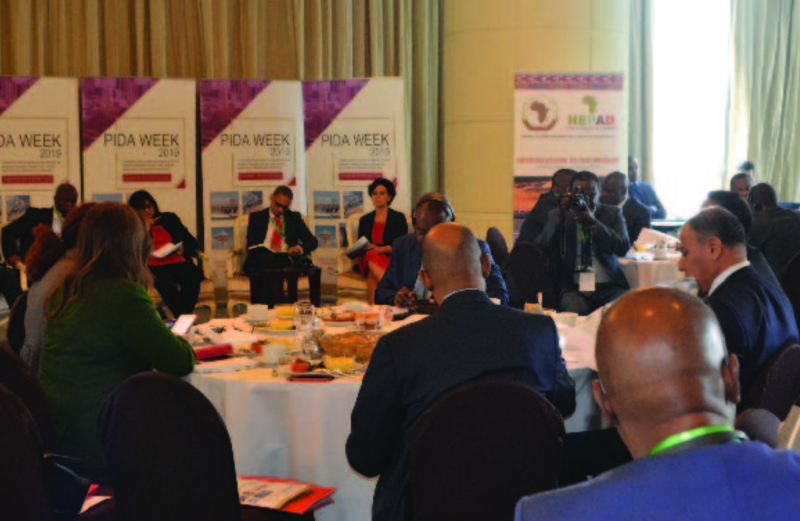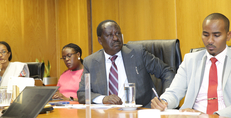PIDA week kicks off with call for enhanced partnership between public and private sector

By Kaleyesus Bekele
Africa’s high profile authorities made a call for enhanced partnership between public and private sector in developing the continent’s infrastructure at the opening of the 5th PIDA Week on Monday November5, 2019 in Cairo, Egypt.
Speaking during the occasion Dr. Ibrahim Assane Mayaki, CEO AUDA-NEPAD, pointed out that 80 percent of the infrastructure projects’ costs were funded by public funds adding that there was a huge gap to implement the PIDA regional projects. Dr. Mayaki stressed the need to attract the private sector to the development of regional projects. According to him, CBN was created to serve as an instrument to channel funding.
Dr. Mayaki touched on the need to conduct a deep study on the challenges of accessing financing. He also stressed the need to work on de-risking and guarantee mechanisms.
HE Amani Abou-Zeid, AU Commissioner for Infrastructure and Energy, said that the PIDA Week is an important plat form to evaluate the achievements and challenges the continent is facing in infrastructure development and the plan for the future. Abou-Zeid said the African heads of states have demonstrated a strong commitment towards the realization of flagship projects of the Agenda 2063. She said that five regional infrastructure projects from each region were selected adding that a project selection criteria was prepared with a participatory approach to be adopted during the week. She touched on the need to attract private investments and utilizing pension and sovereign funds. “We should learn from our errors and focus on the projects that we are going to implement in the next ten years. We should learn how we can be more attractive to investment. We should re-draft how we present bankable projects so as to be able to bring stakeholders from the public and private,” she added.
The 50 projects selected from the five regions are expected to change the shape of Africa.
Ms. Barbara Schaefer, representative of Germany, noted that Germany was supporting infrastructure development projects in Africa as it understands the need for regional economic integration and overcoming borders. Germany supported various instruments including job creation tool kit and network of women in infrastructure. “We focus on private sector involvement and de-risking mechanisms,” she said.
Mr. Mamady Souare, Manager, Regional Integration Operations Division, AfDB, said the role of the private sector in infrastructure development was fundamental. Souare stressed the need to integrate international and national fundings. With regards to risk Souare said AfDB assists the private sector in doing risk assessment.
Mr. Robert Lisinge, Chief of Energy, Infrastructure and Services Section, UNECA, highlighted the political and regulatory risk the private sector faces. “Different countries have different investment climates. Capacity issues-There is lack of capacity to prepare bankable projects,” he said. He also noted most African countries lack the capacity to negotiate with the private sector. The UNECA has created a division that works on these issues. Currency stability was the other challenge Lisinge cited.
A representative of the African Import Export Bank noted that the bank has been working on capacity building, and de-risking mechanism , which are key to unlocking capital. The bank is working with 51 out of the 54 member states. The representative highlighted the need to work on inter state guarantee to allow the flow of goods between countries. “Access to information is a huge gap. We created a trade information portal,” she said. She said access to foreign currency is also a huge challenge. “Access to USD is a huge challenge,” she added.
Representative of the EU Mrs. Carla Montesi, reaffirmed the commitment of the EU in supporting Africa’s regional economic integration. According to Motensi, the EU has provided one billion euro for energy, transport and ICT development projects in the past seven years. The need for infrastructure financing is very high. It has never been enough and this calls for the involvement of the private sector. Last week the EU pledged to extend 1.6 billion euro grant at the African Investment Forum.
HE Ambassador Khaled Emara, Assistant Foreign Minister for African Organizations and Communities and Personal representative of the President of the Arab Republic of Egypt to AUDA-NEPAD, stated that weak infrastructure in Africa was obstructing economic growth. Ambassador Emara stressed the need to expedite infrastructure development projects to achieve the 2063 development agenda.
Since its inception in 2015 PIDA Week has evolved and grown to become the flagship advocacy and marketing event for the PIDA program and specifically projects in need of financing. The format of the event provides an opportunity to engage and exchange information on PIDA in particular and infrastructure development in general.
More than 700 delegates are participating in the PIDA Week 2019, which is being held under the theme “Positioning Africa to deliver on Agenda 2063 through multi-sectoral approaches to infrastructure development.”



